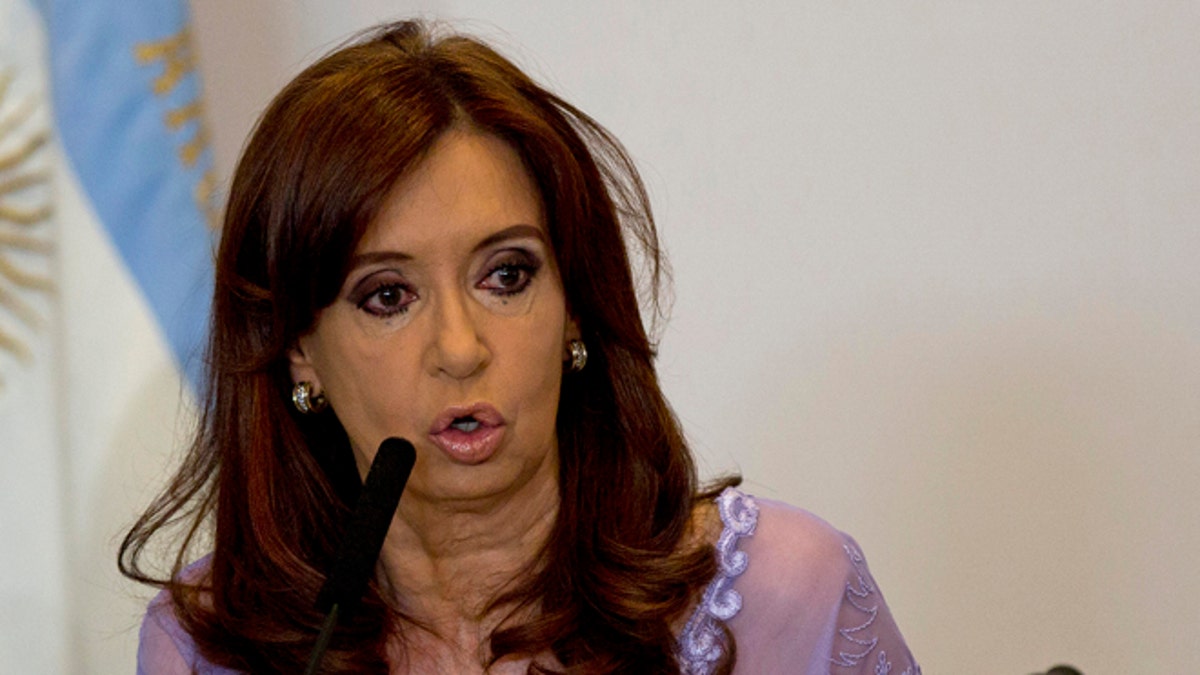
Argentine President Cristina Fernández de Kirchner (AP Photo/Rodrigo Abd)
The Argentine prosecutor who took over the investigation of the 1994 bombing of a Jewish center in Buenos Aires following the death of Alberto Nisman has taken the next step in bringing formal charges against President Cristina Fernández de Kirchner for allegedly trying to cover up Iran's role in the attack.
Prosecutor Gerardo Pollicita's decision to go forward with the case is significant because it sets the stage for a close examination of the investigation that prosecutor Nisman was building before he was found dead Jan. 18.
Nisman had accused Fernández de Kirchner, Foreign Minister Héctor Timerman and others in her administration of brokering the cover-up in exchange for favorable deals on oil and other goods from Iran. Fernández has strongly denied the accusations, and Iran has repeatedly denied involvement in the bombing, which killed 85 people.
Pollicita will present his finding to Judge Daniel Rafecas, the federal magistrate assigned to the case who will ultimately decide whether to dismiss it or indict the president and others named in the report. Pollicita's 62-page statement was posted on the prosecutor general’s website and is addressed Rafecas.
"Nisman determined the decision to shield those of Iranian origin who were implicated in the July 18, 1994, terrorist attack," Pollicita's report reads, "was taken by Cristina Fernández de Kirchner, the chief executive, and carried out, for the most part, by the Minister of Foreign Relations, Héctor Timerman."
A number of others were named in the charges, including congressman Andrés Larroque.
Pollicita's action was widely expected.
Jason Marczak, deputy director of the Adrienne Arsht Latin America Center at the Atlantic Council in Washington, D.C., told Fox News Latino, "There was no way that this step wasn't going to be taken. Not having taken it would have made people cry foul and suspect a cover-up."
Even before Pollicita's decision, amid rumors that it was coming, the administration was moving to both reject and minimize it.
Speaking to reporters early Friday, Presidential spokesman Anibal Fernández said moving the case forward was a "clear maneuver to destabilize democracy" but that ultimately "it has no legal value. It does not matter."
According to the New York Times, both Fernández de Kirchner and Timerman have immunity as serving members of the executive branch. In order to bring them to trial for these charges, a judge would authorize a political trial – a proceeding somewhat analogous to an impeachment in the United States – and ask Congress to lift their immunity.
"Fernández de Kirchner has 10 months left in office," Marczak pointed out. "It's very unlikely we're going to see her brought to trial while still president."
A silent march has been scheduled for Wednesday, Feb. 18, the one-month anniversary of Nisman's death.
If nothing else, Marczak said, "These charges will change the nature of the marches next week. You're likely to start to see calls for Fernández de Kirchner to be impeached."
The Associated Press contributed to this report.
